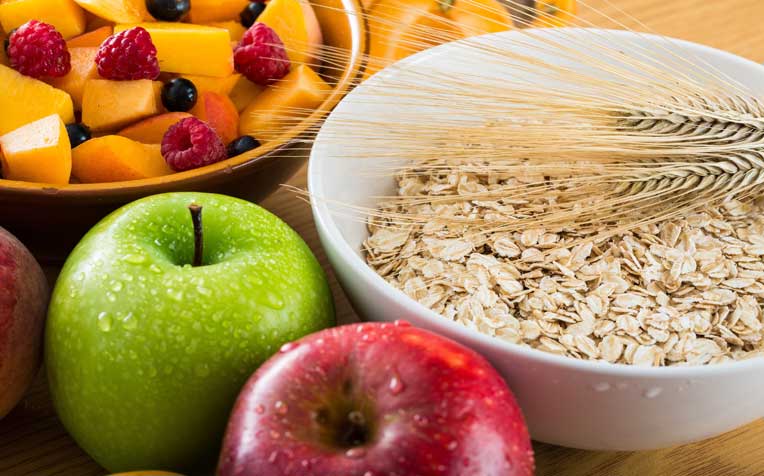
Adequate fibre intake promotes healthy bowel function, controls cholesterol and blood sugar levels, and aids in weight loss.
Adequate amounts of dietary fibre intake can promote good health. The Singapore Health Promotion Board recommends a daily dietary fibre intake of 20g for women and 26g for men. This equates to 2 servings of fruit and 2 servings of vegetables per day. Breaking this down to per meal would be having a half plate of fruits and vegetables at each meal.
Dietary fibres are parts of plant foods that your body can’t digest. There are two types of fibre: soluble and insoluble fibre. “Both types of fibre (soluble and insoluble) are important for optimal health.” says Ms Chong Ai Heong, Principal Dietitian from the Department of Dietetics at Singapore General Hospital (SGH), a member of the SingHealth group.
Soluble fibre dissolves in water to become gummy or viscous, promotes the excretion of fatty substances such as cholesterol and helps to regulate the body’s use of sugars.
Insoluble fibre does not dissolve in water, but adds bulk and softness to stools. Thus, insoluble fibre promotes bowel regularity.
Health benefits of adequate dietary fibre intake
Adopting an adequate fibre diet can help to:
1. Promote healthier bowel function
Dietary fibre increases the weight of stools and softens it. The stooI passes through the intestinal tract easily, thus reduces the need for strained bowel movements. This helps to maintain bowel health and to avoid constipation. In addition, insoluble fibre decreases the transit time of food waste through the intestinal tract. This reduces the period of time when potentially harmful substances in food waste can come in contact with the intestinal wall.
2. Control blood sugar levels
Soluble fibre slows down the release of sugars from digested food into the bloodstream, thus preventing a rapid rise in blood sugar levels. This can help people with type 2 diabetes improve their blood sugar levels.
3. Lower cholesterol levels
Soluble fibre may help to lower total cholesterol levels, mainly by lowering the LDL-cholesterol or ‘bad’ cholesterol. Fibre appears to help bile acids which are made of cholesterol to pass through the intestine as waste. Thus, the body absorbs less dietary cholesterol.
4. Improve weight management
High fibre foods generally requires a longer time for you to chew. This slows you down and may make you eat less. Besides, with the added bulk, they help you feel full for a longer period.
Eat a variety of high-fibre foods. If your diet is typically low in dietary fibre, increase your fibre intake gradually. Sudden `bulking up’ may cause bloating and flatulence, warns Ms Chong.
Best dietary sources of fibre
Foods high in soluble fibre:
- Oats, barley, oat bran, psyllium husk
- Legumes – peas, beans, lentils
- Fruits such as apple, orange and pear
- Carrots
Foods high in insoluble fibre:
- Brown rice, whole wheat, wheat bran
- Seeds and nuts
- Many kinds of vegetables including green leafy vegetables, cabbage and tomato
Fibre supplements
Fibre supplements do not have the same health benefits as naturally occurring high-fibre foods, says Ms Chong.
“We should be eating more natural fibre which is found in whole grains, fruits, vegetables, seeds and nuts rather than taking fibre supplements. Besides fibre, whole food contains nutrients including antioxidants and other biological active components which can offer more protection against chronic diseases.”
8 Ways to increase fibre in your meals
- Replace white rice with brown rice. If you can't do this suddenly, go for half and half
- Choose wholegrains for breads, cereals and pasta
- Ask for more vegetables (and stay away from the gravy) when ordering food
- Eat a rainbow of fruits and vegetables
- Eat the whole fruit (instead of having fruit juices)
- If you are a meat-lover, throw in some fruits and vegetables when cooking the dish
- Or replace the meat with beans, lentils and other legumes
- Purchase a variety of fruit and vegetables to ensure sufficient fibre intake for everyone in the family
Ref: T12
Check out other food tips:
Chinese Hawker Foods: Healthiest and Most Unhealthy
Malay Hawker Foods: Healthiest and Most Unhealthy
Indian Hawker Foods: Healthiest and Most Unhealthy















